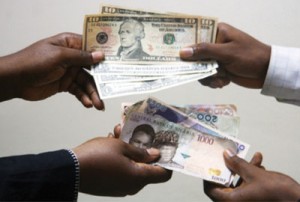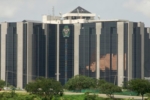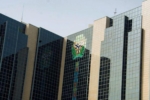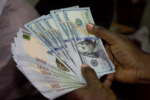Pressures on the external sector seem persisting as outstanding foreign exchange demand on Forwards Contracts is now put at about USD4 billion despite several auctions by the Central Bank of Nigeria, CBN, to bring it down.Sources at the apex bank told Vanguard that CBN believes most of the demands are speculative adding that it would continue to do its best to clear the backlog.
This was coming as the Naira depreciated significantly for the first time in recent months in the official interbank exchange rate closing at N315/ USD1, as against the stable N305/ USD1 in the past six months, while the parallel market rate still hovered between N498 and N500 to one USDollar.
Meanwhile foreign reserves remained in robust, rising by USD130 million on Friday to hit USD28.2 billion, a development which was expected to moderate exchange rates across all market segments.
The apex bank had struggled to erase the backlog of foreign exchange demands since it began the new flexible foreign exchange regime mid last year, injecting over USD5 billion in batches with the latest batch injected last week amounting USD660 million for three-month and five-month currency forwards
However, the weekly movements in most dated forward contracts at the interbank OTC (Over-The-Counter) segment suggests future stability of the Naira against the US Dollar.
The spot rate for 1 month, 3 months, 6 months and 12 months forward contracts remained stable week-on-week at N305.25/USD, N315.34/USD, N323.27/USD, N331.53/USD and N349/USD respectively amid USD7.5 million in intervention sales by CBN to banks.
But financial market analysts at Cowry Asset Management Limited stated that ‘‘in the current week, despite efforts to stabilize the exchange rate, we still expect sustained pressure on the Naira.’’
Analysts at Cardinal Stone Partners, a Lagos based investment house, said ‘‘the tone on foreign exchange remains hawkish as the monetary authorities intend to continue with efforts targeted at curtailing demand pressures and will look even to directly moderate growth in narrow money in 2017.’’
Referring to the recent decision of CBN’s Monetary Policy Committee, MPC, to retain all benchmark interest rates, they stated: ‘‘Even with the MPC’s dovish rhetoric, we think a rate cut is unlikely unless there is a significant moderation in inflationary conditions and unless the FX supply situation at the interbank market improves substantially. Until then, we anticipate the CBN’s tightening cycle will continue, although the frequency and volume of open market operations (OMOs) will provide more clarity as to monetary policy’s direction in 2017.’’
Reacting to the increasing external reserve and expectations that it would moderate pressure on exchange rate, Managing Director of Afrinvest West Africa, another Lagos based financial investment house, Mr Ike Chioke, stated: ‘‘I know we have a slide on the FX Forwards position and as at last count we were at USD 4 billion of unsettled Forwards Contract, that if it is settled immediately, will take out USD4 billion from the external reserves and then you then go back to lower position without including the new demand for Dollar that will happen this month, this quarter and the rest of the year.
The CBN, at its last MPC meeting, indicated that it would soon commence an accommodative monetary policy stance. This may drop the interest rate.
On the inflationary implication of the policy, Akinwunmi stated: ‘‘Theoretically raising interest rate should reduce inflation rate provided the rising inflation rate is caused by too much money in the system pursuing few goods. But in the Nigeria case we are seeing the pass- through effects of the devaluation of the Naira on domestic prices. But the CBN has maintained a tight policy to discourage capital flight from Nigeria and encourage inflows of Foreign Portfolio Investments (FPIs) in order to increase the stock of foreign exchange in Nigeria.
Ultimately when the stock of foreign exchange increases the value of the Naira may remain the stable and which will eliminate the pass-through effect weak exchange rate on the inflation rate.’’
Source: Vanguard
This page has been viewed 252 times






























